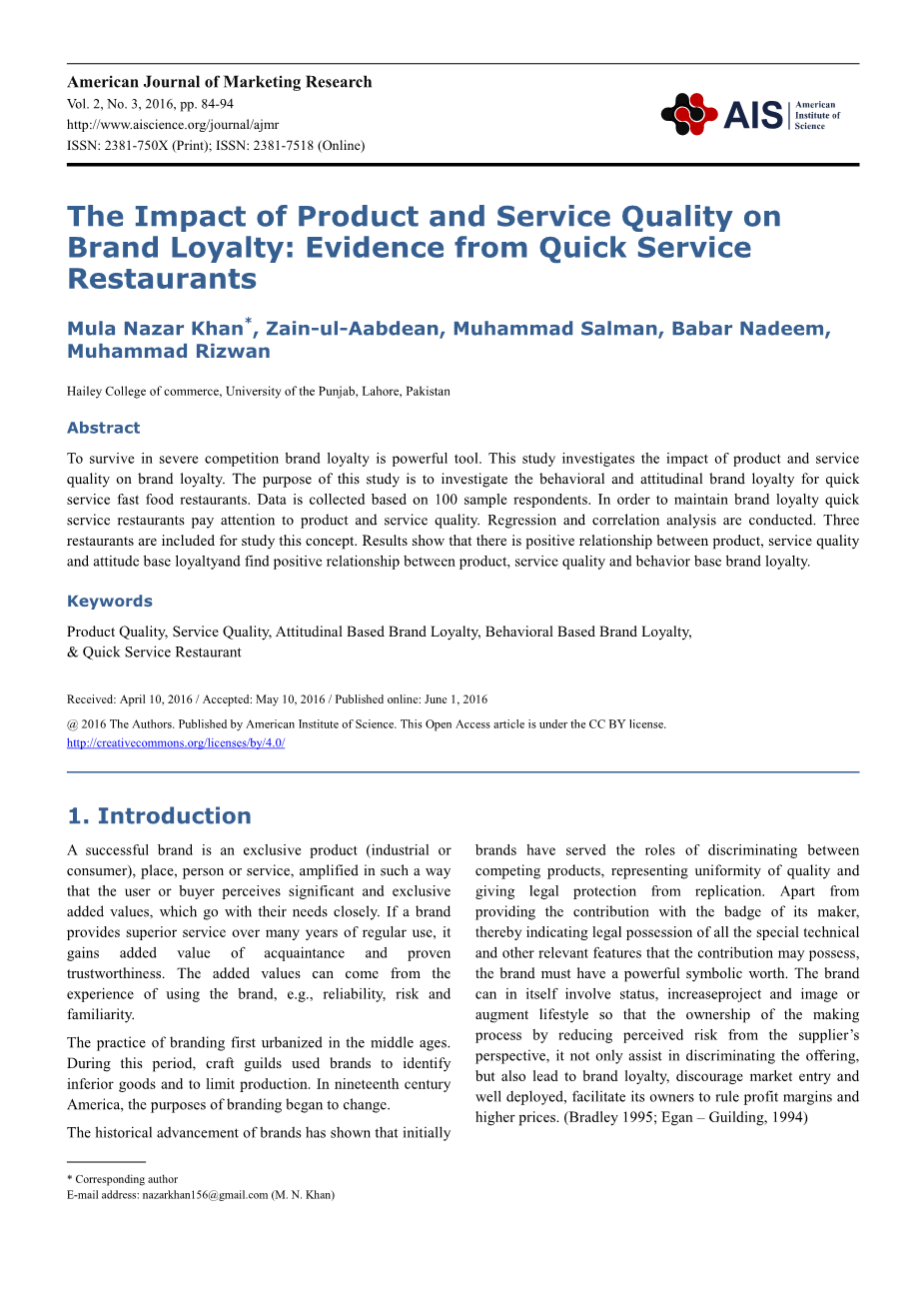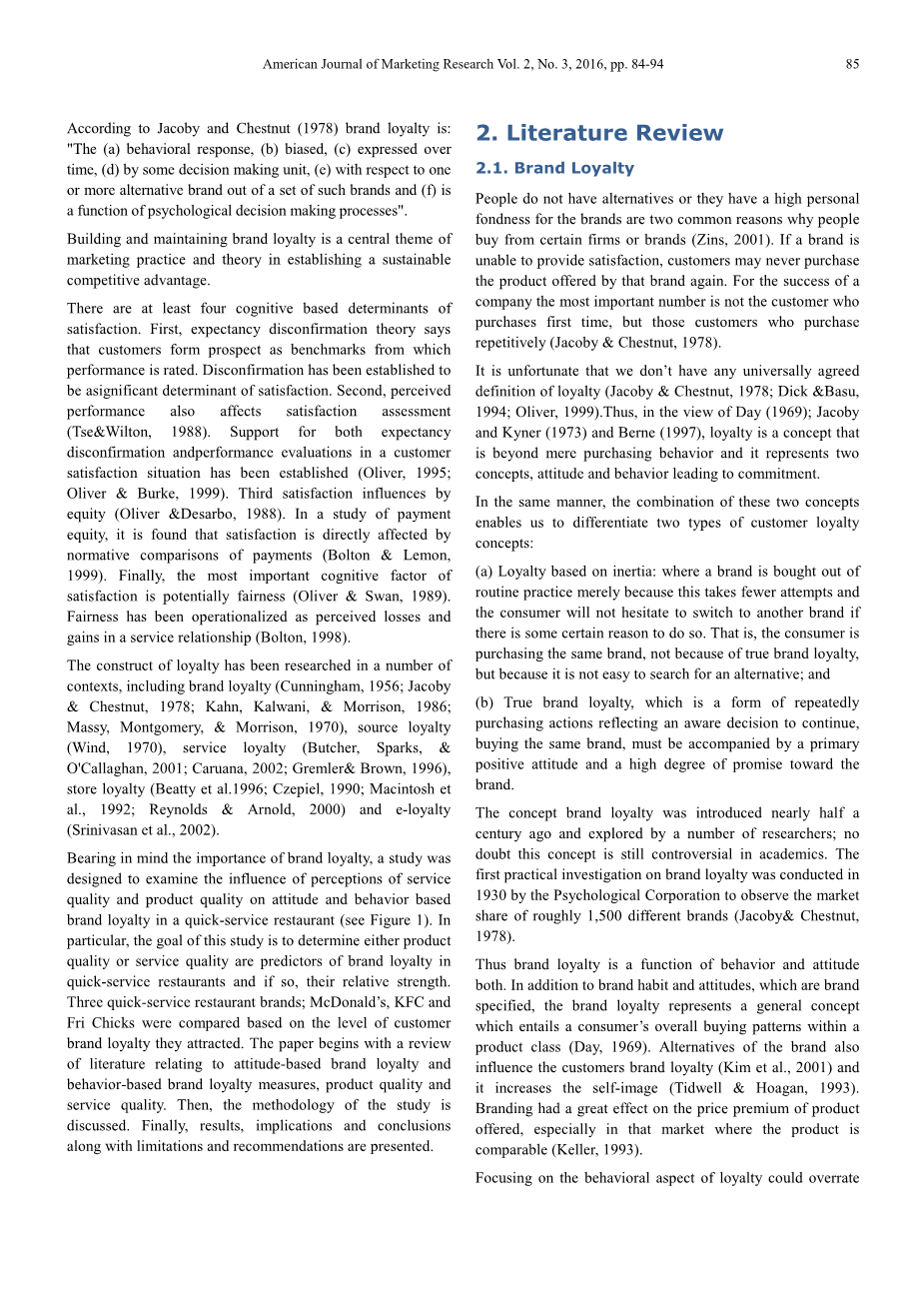

英语原文共 11 页,剩余内容已隐藏,支付完成后下载完整资料
The Impact of Product and Service Quality on Brand Loyalty: Evidence from Quick Service Restaurants
产品和服务质量对品牌忠诚度的影响:来自快餐馆的佐证
Abstract
To survive in severe competition brand loyalty is powerful tool. This study investigates the impact of product and service quality on brand loyalty. The purpose of this study is to investigate the behavioral and attitudinal brand loyalty for quick service fast food restaurants. Data is collected based on 100 sample respondents. In order to maintain brand loyalty quick service restaurants pay attention to product and service quality. Regression and correlation analysis are conducted. Three restaurants are included for study this concept. Results show that there is positive relationship between product, service quality and attitude base loyalty and find positive relationship between product, service quality and behavior base brand loyalty.
摘要:
要在竞争激烈的竞争中生存,品牌忠诚度是强大的工具。本研究调查了产品和服务质量对品牌忠诚度的影响。本研究的目的是为快餐店调查基于行为和态度的品牌忠诚度。数据是基于100个受访者样本。为了保持品牌忠诚度,快餐厅更加注重产品和服务质量。对此进行了回归计算和相关分析。有三个餐厅参与研究这个概念。结果表明,产品、服务质量和基于态度的忠诚之间存在着正相关关系,产品、服务质量和基于行为的品牌忠诚之间也存在正相关关系。
Keywords
Product Quality Service Quality Attitudinal Based Brand Loyalty Behavioral Based Brand Loyalty amp; Quick Service Restaurant
关键词:
产品质量 服务质量 基于态度的品牌忠诚度 基于行为的品牌忠诚度 快餐厅
1. Introduction
A successful brand is an exclusive product (industrial or consumer), place, person or service, amplified in such a way that the user or buyer perceives significant and exclusive added values, which go with their needs closely. If a brand provides superior service over many years of regular use, it gains added value of acquaintance and proven trustworthiness. The added values can come from the experience of using the brand, e.g., reliability, risk and familiarity.
1.绪论
一个成功的品牌是用一种独家的产品(工业或消费者)、地方、个人或服务,以使用户或购买者感到与其需求密切相关,并且扩大到有意义和独家的附加价值。如果一个品牌在多年的常规运营中提供卓越的服务,它将获得常客的附加价值和经过验证的依赖感。附加值可以来自使用品牌的经验,例如可靠性,风险和熟悉度。
The practice of branding first urbanized in the middle ages. During this period, craft guilds used brands to identify inferior goods and to limit production. In nineteenth century America, the purposes of branding began to change.
品牌的概念首先在中世纪流行。在此期间,工艺公会利用品牌识别劣质商品并限制生产。在十九世纪的美国,品牌的目的开始变化。
The historical advancement of brands has shown that initially brands have served the roles of discriminating between competing products, representing uniformity of quality and giving legal protection from replication. Apart from providing the contribution with the badge of its maker, thereby indicating legal possession of all the special technical and other relevant features that the contribution may possess, the brand must have a powerful symbolic worth. The brand can in itself involve status, increase project and image or augment lifestyle so that the ownership of the making process by reducing perceived risk from the supplierrsquo;s perspective, it not only assist in discriminating the offering, but also lead to brand loyalty, discourage market entry and well deployed, facilitate its owners to rule profit margins and higher prices. (Bradley 1995; Egan – Guilding, 1994)
品牌的历史推进表明,最初的品牌产生了歧视产品之间的作用,代表了质量的一致性,并提供了法律保护不被复制。除了要提供其制造商徽章外,还要有表明法定拥有所有可能具有的特殊技术和其他相关特征,所以品牌必须具有强大的象征价值。品牌本身可能涉及到市场地位,增加的项目和形象,或增加的生活方式,以使制作过程的所有权通过从供应商的角度降低感知风险。它不仅有助于区分产品,而且还会导致品牌忠诚度,阻止其他市场进入和部署良好,方便业主规划利润率和更高的价格。(Bradley 1995; Egan –Guilding, 1994)
According to Jacoby and Chestnut (1978) brand loyalty is: 'The (a) behavioral response, (b) biased, (c) expressed over time, (d) by some decision making unit, (e) with respect to one or more alternative brand out of a set of such brands and (f) is a function of psychological decision making processes'.
Jacoby和Chestnut(1978)认为,品牌忠诚度是:(a)行为反应,(b)偏见,(c)会随着时间的推移表达,(d)由一些决策单位组成,(e)相对于一组这样的品牌中的一个或多个替代品牌,(f)是有利于心理决策的功能。
Building and maintaining brand loyalty is a central theme of marketing practice and theory in establishing a sustainable competitive advantage.
建立和维护品牌忠诚度是建立在可持续竞争优势的营销实践和理论的核心主题。
There are at least four cognitive based determinants of satisfaction. First, expectancy disconfirmation theory says that customers form prospect as benchmarks from which performance is rated. Disconfirmation has been established to be a significant determinant of satisfaction. Second, perceived performance also affects satisfaction assessment (Tseamp;Wilton, 1988). Support for both expectancy disconfirmation and performance evaluations in a customer satisfaction situation has been established (Oliver, 1995; Oliver amp; Burke, 1999). Third satisfaction influences by equity (Oliver amp;Desarbo, 1988). In a study of payment equity, it is found that satisfaction is directly affected by normative comparisons of payments (Bolton amp; Lemon, 1999). Finally, the most important cognitive factor of satisfaction is potentially fairness (Oliver amp; Swan, 1989). Fairness has been operationalized as perceived losses and gains in a service relationship (Bolton, 1998).
至少有四个认知是满足决定因素的。首先,预期不确定理论认为客户将绩效评估作为基准。预期不确定是确定满意度的一个重要决定因素。第二,感知绩效也影响满意度评估(Tse&Wilton,1988)。预期不确定理论和绩效评估均支持顾客满意理论(Oliver,1995; Oliver&Burke,1999)。第三,满意程度也受权益影响(Oliver&Desarbo,1988)。在支付平衡的研究中,发现满意度直接受到付款方式的影响(Bolton&Lemon,1999)。最后,满意的最重要的已知因素是潜在的公平性(Oliver&Swan,1989)。公平已经被视为服务关系中可感知的损失和收益(Bolton,1998)。
The construct of loyalty has been researched in a number of contexts, including brand loyalty (Cunningham, 1956; Jacoby amp; Chestnut, 1978; Kahn, Kalwani, amp; Morrison, 1986; Massy, Montgomery, amp; Morrison, 1970), source loyalty (Wind, 1970), service loyalty (Butcher, Sparks, amp; O#39;Callaghan, 2001; Caruana, 2002; Gremleramp; Brown, 1996), store loyalty (Beatty et al.1996; Czepiel, 1990; Macintosh et al., 1992; Reynolds amp; Arnold, 2000) and e-loyalty (Srinivasan et al., 2
全文共56060字,剩余内容已隐藏,支付完成后下载完整资料
资料编号:[1393]
以上是毕业论文外文翻译,课题毕业论文、任务书、文献综述、开题报告、程序设计、图纸设计等资料可联系客服协助查找。


